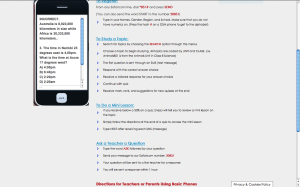Necessity breeds invention, the old saying goes, and in the case of bringing education to those with limited educational resources, and closing the gaps between those who have access and those who don’t, this necessity is turning people’s attention to mobile technology for creative and innovative ways to learn from one another and the Internet.
In developing countries, poor infrastructure, and the relatively low cost, availability, and mobility of mobile phones have resulted in mobile technology as the way to get online and connect locally and globally. It is why mobile technology is the tool that innovative and concerned citizens are turning to in an effort to connect students and teachers to educational texts and a global community of educators.
Africa is a great example of such a scene where mobile learning is being used to reach marginalized populations.
In Ghana, with the help of e-readers, villages have access to hundreds of books that could never be physically sent to a library.
Despite its limitations – unavailability of local language books in some countries– e-readers have opened up the world to curious learners and can be a very effective and inexpensive way to eradicate illiteracy globally.
Nigeria is another example where UNESCO is piloting a program with English Language teachers who send daily messages on how to teach English to teachers throughout Nigeria. UNESCO has received feedback from participating teachers that the support is changing their teaching style and helping them to improve. As a result, teachers are part of a global village of educators where they can collaborate and share their concerns, challenges and successes.
 In Kenya, Eneza is a group of individuals who wanted to ensure that every child in Kenya has access to information no matter where they live and how poor they were. They decided to put together the information and content that is relevant to the local context on mobile devices and make it available to students everywhere. In addition, they provide tips and tricks for teachers and parents to help their children learn.
In Kenya, Eneza is a group of individuals who wanted to ensure that every child in Kenya has access to information no matter where they live and how poor they were. They decided to put together the information and content that is relevant to the local context on mobile devices and make it available to students everywhere. In addition, they provide tips and tricks for teachers and parents to help their children learn.
Innovation hubs, like the iHub in Kenya, are places where teachers and tech savvy can meet and optimize the use of simple technologies for teaching and learning. Creating more innovative spaces like the iHub in Kenya, providing e-readers with native language textbooks, delivering qualified trained online communities of teachers for remote areas, are some of the low cost effective ways to meet necessity, breed innovation whilst creating global communities of learners and teachers.